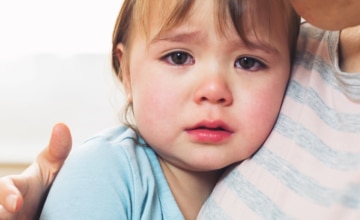Dorinda Silver Williams, Georgetown University Center for Child and Human Development and ZERO TO THREE Washington, DC

PRACTICAL TIPS AND TOOLS
COVID-19 has rocked us to our collective core. The implications of the virus permeate daily life—threatening to undermine our sense of safety and well-being on every level. Given the depth, breadth, and complexity of this crisis, what is the potential impact of these stressful conditions on the development and mental health of very young children?
For families with infants and young children, the considerable stressors of parenting very young children are overlaid with a cascade of unprecedented, destabilizing, and unpredictable stressors associated with the pandemic. While very young children may not know exactly what is happening in their world, they certainly pick up on intense feelings affecting the important adults in their lives. Disruptions in routines, temporary or permanent separations from primary caregivers, and problems in primary relationships due to parent/caregiver distress, may further contribute to the impact of COVID on infants and young children.
Fortunately, parents and caregivers can play a key role in supporting their little ones during the pandemic. Here are some quick tips for helping young children feel grounded and protected.
- This is a great time for a little more nurturing and togetherness. Snuggling with a book together, getting in some extra hugs, or just grabbing that extra 5 minutes to stack more blocks or blow more bubbles, can go a long way.
- Infants and toddlers thrive on structure, predictability, and routines—it helps them to feel safe and secure. Maintaining existing routines as much as possible—or creating new ones—can help everyone feel a little more anchored—even in the midst of transitions and unknowns.
- Caring for the caregiver. Finding moments of self-nurturance, such as reading a humorous article, calling a cherished friend or relative, or just taking some mindful breaths, can help parents and caregivers stay calm and regulated for their young children.
- Reaching out for additional support reflects caregiver strength. When caregivers are feeling distressed, it might be harder for them to be the “protective shield” (Freud, as cited in Reyes & Lieberman, 2012) that they want to be for their young children. Parents and caregivers can seek counseling for themselves through a wide range of options, including: community-based clinicians, primary care providers, faith-based counselors, and home visitor programs—many of whom have stepped up access to telehealth during COVID-19.
Even in the strongest families, young children can and do suffer from mental health issues. DC:0-5TM: Diagnostic Classification of Mental Health and Developmental Disorders of Infancy and Early Childhood (ZERO TO THREE, 2016) described and defined these disorders. During COVID-19, infants and young children may be at greater risk for mental health problems and demonstrate symptoms of anxiety; mood problems; trauma, stress, and deprivation issues; and sleep, eating, and crying difficulties. These may be transient symptoms or may be more clinically significant and impairing, rising to the level of mental health disorder and requiring treatment. Treatment for very young children is always relationship-based and involves the child and their primary caregiver(s).
Parents, caregivers, and infant and early childhood mental health (IECMH) professionals can be proactive by looking out for signs of stress in young children:
- changes in eating, sleeping, or both
- return to earlier behaviors, such as thumb sucking or going back to diapers
- irritability, including increased whining and/or aggressive behaviors, such as hitting or biting
- clinginess or having a hard time separating from caregivers
- withdrawn, such as not as interested or engaged in play, activities, or other interactions
- physical complaints, such as stomachaches or headaches
Parents/caregivers who are concerned about their infants’ or toddlers’ mental health can gain access to evaluative and treatment services through multiple ports of entry, including pediatricians, Birth to Three programs, home visitation programs, university-based programs, and other IECMH programs in their local communities. Families might even find options for accessing IECMH services via telehealth. For more information about finding IECMH services in your local area, contact your state association for infant mental health, the Alliance for the Advancement of Infant Mental Health (www.allianceaimh.org), or your insurance company or managed care organization.
Now, more than ever, ZERO TO THREE will continue to work to amplify the voices and needs of babies and toddlers, as well as the important adults in their lives. For all of you who share our mission—as parents, caregivers, and helping professionals—we thank you for your benevolent presence in the lives of young children. Be gentle with yourselves and stay well.
About the Author
Dorinda Silver Williams, PhD, LCSW-C, LICSW, is a licensed clinical social worker with a comprehensive background in infant and early childhood mental health (IECMH), parent–child attachment, reflective practice, home visitation, family stress and trauma, and military social work. In her role as assistant professor at Georgetown University’s Center for Child and Human Development (GUCCHD), Dr. Williams has engaged in research and clinical work focused on implementation and evaluation of reflective practice models; integration of evidence-based interventions for young children and their families into multiple, innovative settings in the District of Columbia (DC); and assessment of perinatal services in DC. Dr. Williams has provided reflective supervision and mentorship across clinical models, in support of interdisciplinary IECMH providers. Prior to her work at GUCCHD, Dr. Williams served as the director of Military Family Projects at ZERO TO THREE. During her tenure at ZERO TO THREE, Dr. Williams developed print materials, produced audioconferences, authored children’s books on sensitive topics, co-developed a parent app, contributed to curricula, provided trauma-informed training and consultation, and spearheaded new initiatives.
Learn More
For more information on infant and early childhood mental health disorders, please refer to ZERO TO THREE resources including:
Infant and Early Childhood Mental Health Promotion, Prevention, and Treatment
For ZERO TO THREE COVID-19 resources:
Coronavirus Resources for Early Childhood Professionals
Addressing Abuse and Neglect During COVID-19
References
Reyes, V., & Lieberman, A. (2012). Child-parent psychotherapy and traumatic exposure to violence. ZERO TO THREE Journal, 32(6), 20–25.
ZERO TO THREE. (2016). DC:0–5TM: Diagnostic classification of mental health and developmental disorders of infancy and early childhood (DC:0–5). Washington, DC: Author.




